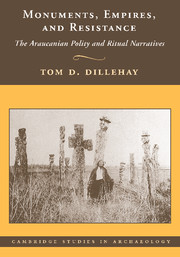Book contents
- Frontmatter
- Contents
- Figures
- Preface
- INTRODUCTION
- PART ONE PROSPECTS AND PATTERNS
- ONE PURPOSES, SETTINGS, AND DEFINITIONS
- TWO SHAPING ANALOGICAL AND CONCEPTUAL PERSPECTIVES
- THREE ARAUCANIAN PREHISTORY AND HISTORY: OLD BIASES AND NEW VIEWS
- FOUR IMBRICATING SOCIAL, MATERIAL, METAPHORICAL, AND SPIRITUAL WORLDS
- FIVE THE ETHNOGRAPHIES OF KUEL, NARRATIVES, AND COMMUNITIES
- SIX AN ARCHAEOLOGICAL VIEW OF KUEL AND REHUEKUEL
- PART TWO ANALYSIS AND INTERPRETATION
- Appendix One Ethnographic Ritual Narratives at Hualonkokuel and Trentrenkuel
- Appendix Two Radiocarbon Dates and Thermoluminescence Dates
- References Cited
- Index
ONE - PURPOSES, SETTINGS, AND DEFINITIONS
Published online by Cambridge University Press: 27 July 2009
- Frontmatter
- Contents
- Figures
- Preface
- INTRODUCTION
- PART ONE PROSPECTS AND PATTERNS
- ONE PURPOSES, SETTINGS, AND DEFINITIONS
- TWO SHAPING ANALOGICAL AND CONCEPTUAL PERSPECTIVES
- THREE ARAUCANIAN PREHISTORY AND HISTORY: OLD BIASES AND NEW VIEWS
- FOUR IMBRICATING SOCIAL, MATERIAL, METAPHORICAL, AND SPIRITUAL WORLDS
- FIVE THE ETHNOGRAPHIES OF KUEL, NARRATIVES, AND COMMUNITIES
- SIX AN ARCHAEOLOGICAL VIEW OF KUEL AND REHUEKUEL
- PART TWO ANALYSIS AND INTERPRETATION
- Appendix One Ethnographic Ritual Narratives at Hualonkokuel and Trentrenkuel
- Appendix Two Radiocarbon Dates and Thermoluminescence Dates
- References Cited
- Index
Summary
In a short time the Spanish conquered the three powerful empires of the American hemisphere, those of Peru, Mexico, and Bogotá, but the hundred and ninety years that have elapsed since the beginning of this conquest have not sufficed to end it with the subjugation of the Araucanians. Nor has the vast expenditure of fifty million pesos and more than 25,000 recruits, nor the effusion of blood that has been spilled done so, even though in the past century the King declared this war to be equal to those of Spain, Flanders, and Italy. Today the Araucanians possess the fairest portion of Chile from the Bio Bio River to the Straits of Chiloé, a hundred and fifty leagues stretching between the Cordillera and the sea. In the whole of this area the Spanish hold nothing but the fortified towns of Arauco and Valdivia: the Indians live in independence and enjoyment of their coveted liberty.
Cόrdoba y Figueroa [1861] 1942, II: 29; translated by and quoted in Padden 1993:88.What faculty or genius did the Araucanians possess which enabled them to succeed so brilliantly where other indigenous American cultures had failed? The Araucanians, under this external pressure [Spanish intrusion] turned inward upon themselves and developed their own corresponding [political and religious] forms to a point of equal resistive strength.
Padden 1993:71.This is old business, walking slowly over the land and the kuel with an appreciation of their needs and of their immediacy to the human senses and form, with knowledge of the history that lies in them and the history that they tell, and in anticipation of the history yet to come.[…]
- Type
- Chapter
- Information
- Monuments, Empires, and ResistanceThe Araucanian Polity and Ritual Narratives, pp. 15 - 52Publisher: Cambridge University PressPrint publication year: 2007

